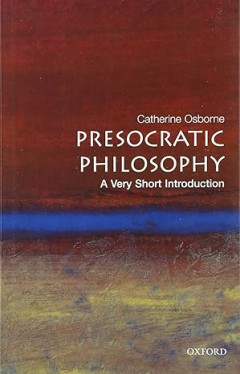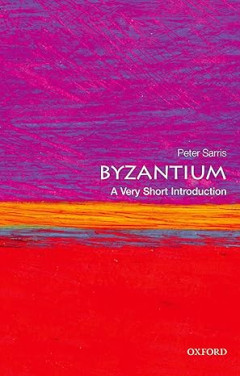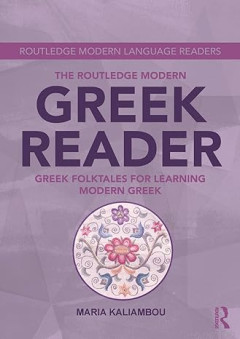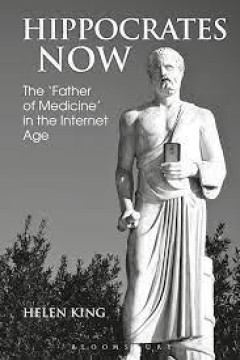Ditapis dengan
E-book Roman Gods : A Conceptual Approach
The concept of ‘god’ forms an important part of the broader category of ‘Roman Religion’ but it is not identical with it. In other words, this book is limited to the single concept that was normally labeled ‘deus’ by the inhabitants of Rome. It refers to other concepts which belong to the sphere of ‘Roman Religion’ only as constituents of this concept of ‘god’. These constit…
- Edisi
- -
- ISBN/ISSN
- 9789004175037
- Deskripsi Fisik
- 230 hlm
- Judul Seri
- -
- No. Panggil
- 292 LIP r
E-book Ancient Greece
Ancient Greece wasn't one big country like modern Greece is today. Instead, areas of land belonged to ‘city states’ (poleis), which all acted separately from the others. Sometimes they would make alliances with each other to fight enemies like the Persians — sometimes the Greek city states would fight each other.
- Edisi
- -
- ISBN/ISSN
- -
- Deskripsi Fisik
- -
- Judul Seri
- -
- No. Panggil
- 938 SCH a
E-book The Look of Lyric: Greek Song and the Visual
Do I paint it natural, Susie, so you think how it looks?’ 1 This is the voice of Emily Dickinson, a defiant and uncanny poet of the modern era, referring to her own verbal skills. Quintessentially lyric, especially if one admits that lyric thrives in the gaps and breaches of conventional generic taxonomies, Dickinson was repeatedly testing the boundaries between the verbal and the visual in h…
- Edisi
- -
- ISBN/ISSN
- 9789004314849
- Deskripsi Fisik
- 404 hlm
- Judul Seri
- -
- No. Panggil
- 880 ATH t

E-book Presocratic Philosophy: A Very Short Introduction
Generations of philosophers, both ancient and modern, have traced their inspiration back to the Presocratics. Part of the fascination stems from the fact that little of what they wrote survives. Here Osborne invites her readers to dip their toes into the fragmentary remains of thinkers from Thales to Pythagoras, Heraclitus to Protagoras, and to try to reconstruct the moves that they were making…
- Edisi
- -
- ISBN/ISSN
- 9780192840943
- Deskripsi Fisik
- 176 pages
- Judul Seri
- -
- No. Panggil
- 182 OSB p

E-book Eyewitness: Ancient Greece
This Eyewitness guide to the Ancient Greek world provides information on the mythical heroes and gods as well as the temples and statues still surviving today.
- Edisi
- -
- ISBN/ISSN
- 9781405320412
- Deskripsi Fisik
- 76 halaman, ilus.
- Judul Seri
- -
- No. Panggil
- 938.0 DEN e
E-book Centaurs, Rioting in Thessaly: Memory and the Classical World
Much of the thought and the practice of human life is irredeem-ably related to Ionia, to Achaea, to classical Greek civilisation. Certainly one, if not the only one, of the central imaginings of ourselves and our world is Ionian. Our mapping of ourselves in our world also owes a huge debt to the classical. The emergence, materialisation, and extra-territorialisation of Ionian spaces of philosop…
- Edisi
- -
- ISBN/ISSN
- 9781947447417
- Deskripsi Fisik
- 119 hlm
- Judul Seri
- -
- No. Panggil
- 938 HUD c

E-book Greek and Roman Mythology A to Z
According to many scholars, ancient Greece and Rome provided the foundations of Western culture. More than two millennia later, myths of both civilizations are still being studied for their rich storytelling and insight into the cultures that spawned them. This title illuminates the mythology at the core of those civilizations' beliefs.
- Edisi
- -
- ISBN/ISSN
- 9781604134124
- Deskripsi Fisik
- 177 halaman, ilus.
- Judul Seri
- -
- No. Panggil
- 292.13 DAL g
E-book Stolen Legacy : Greek Philosophy is Stolen Egyptian Philosophy
The knowledge that the African continent gave civilization the Arts and Sciences, Religion and Philosophy is des- tined to produce a change in the mentality both of the White and Black people. 2. There are three persons in the drama of Greek philosophy: (a) Alexander the Great; (b) Aristotle's School and; (c) The Ancient Roman Government who are responsible for a false tradition about Africa an…
- Edisi
- -
- ISBN/ISSN
- 9781635610574
- Deskripsi Fisik
- 135 hlm
- Judul Seri
- -
- No. Panggil
- 182 JAM s

E-book Byzantium: A Very Short Introduction
After surviving the fifth century fall of the Western European Roman Empire, the Byzantine Empire flourished as one of the most powerful economic, cultural, and military forces in Europe for a thousand years. In this Very Short Introduction Peter Sarris introduces the reader to the unique fusion of Roman political culture, Greek intellectual tradition and Christian faith that took place in t…
- Edisi
- -
- ISBN/ISSN
- 9780199236114
- Deskripsi Fisik
- 322 halaman
- Judul Seri
- -
- No. Panggil
- 949.5 SAR b

E-book Greek Gods & Goddesses
Giving Western literature and art many of its most enduring themes and archetypes, Greek mythology and the gods and goddesses at its core are a fundamental part of the popular imagination. At the heart of Greek mythology are exciting stories of drama, action, and adventure featuring gods and goddesses, who, while physically superior to humans, share many of their weaknesses. Readers will be int…
- Edisi
- -
- ISBN/ISSN
- 9781622751532
- Deskripsi Fisik
- 132 halaman, ilus.
- Judul Seri
- -
- No. Panggil
- 398.2 TAF g
E-book Horos : Ancient Boundaries and the Ecology of Stone
The market today resembles a Leviathan, a great beast growing in accordance with no law outside of the vain rapacity of its uncanny monstrosity, extending its boundaries beyond the nation-state, beyond government intervention, beyond ecologically safe limits and beyond our will to enter into it. It has become properly automatic, functioning for no purpose outside of itsel…
- Edisi
- -
- ISBN/ISSN
- 9781800642683
- Deskripsi Fisik
- 351 hlm
- Judul Seri
- -
- No. Panggil
- 938 POT h
E-book Spoken World: Greek
This simple and effective introduction to Greek teaches everything one needs to speak, understand, read, and write in Greek. This program assumes no background in the language, and it explains each new concept clearly with plenty of examples, making it ideal for beginners or anyone who wants a thorough review.
- Edisi
- -
- ISBN/ISSN
- 9781400024599
- Deskripsi Fisik
- 180 halaman
- Judul Seri
- -
- No. Panggil
- 487.4 ARG s

E-book The Routledge Modern Greek Reader
The Routledge Modern Greek Reader has been specially designed for post-beginners to advanced learners of Greek. Written by an experienced instructor, this innovative reader offers both students and teachers of Modern Greek the pedagogical tools to utilise richly textured folktale material in a language class. Students can develop their linguistic skills while simultaneously engaging with the…
- Edisi
- -
- ISBN/ISSN
- 9781315749914
- Deskripsi Fisik
- 180 halaman
- Judul Seri
- -
- No. Panggil
- 487.4 KAL t 002899-eB-0122

E-book Just Prospering? Plato and the Sophistic Debate about Justice
This book argues that Plato’s Republic must be understood as developing out of a 5th Century sophistic debate. In Part One the author presents a new analysis of the sophists and their extant texts addressing the important topics of justice and its value. This part shows that already in the 5th Century there was a robust debate about whether the just or unjust life was better for the self-inte…
- Edisi
- -
- ISBN/ISSN
- 9780197267660
- Deskripsi Fisik
- 238 halaman
- Judul Seri
- -
- No. Panggil
- 183 AND j
E-book Cities, Monuments and Objects in the Roman and Byzantine Levant
Cities, Monuments and Objects in the Roman and Byzantine Levant celebrates Gabriel Mazor and his lifetime of work at the monumental city of Nysa-Scythopolis, Bet She?an Bays?n. This metropolis, part of the storied Decapolis, or league of ten cities, that flourished during the Hellenistic, Roman-Byzantine and very early Islamic periods until the devastating earthquake of AD 748, has been the sin…
- Edisi
- -
- ISBN/ISSN
- 9781803273358
- Deskripsi Fisik
- 318 halaman
- Judul Seri
- -
- No. Panggil
- 938.0
E-book Ancient Greence : From Prehistoric to Hellenistic Times
“Most things in the history of Greece have become a subject of dispute” is how Pausanias, the second-century a.d. author of a famous guide to sites throughout Greece, summed up the challenge and the fascination of thinking about the significance of ancient Greek history (Guide to Greece 4.2.3). The subject was disputed then because Pausanias, a Greek, lived and wrote under the Roman Empire,…
- Edisi
- -
- ISBN/ISSN
- 9780300160055
- Deskripsi Fisik
- 325 hlm
- Judul Seri
- -
- No. Panggil
- 938 MAR a

E-Book Blessed Thessaly: The Identities of a Place and Its People from the Ar…
Thessaly was a region of great importance in the ancient Greek world, possessing both agricultural abundance and a strategic position between north and south. It presents historians with the challenge of seeing beyond traditional stereotypes (wealth and witches, horses and hospitality) that have coloured perceptions of its people from antiquity to the present day. It also presents a complex and…
- Edisi
- -
- ISBN/ISSN
- 9781835530016
- Deskripsi Fisik
- 520 halaman
- Judul Seri
- -
- No. Panggil
- 938 AST b
E-book The Ancient City : A Study on the Religion, Laws, and Institutions of …
It is proposed here to show upon what principles and by what rules Greek and Roman society was governed. We unite in the same study both the Greeks and the Romans, because these two peoples, who were two branches of a single race, and who spoke two idioms of a single language, also had the same institutions and the same principles of government, and passed through a series of similar revolution…
- Edisi
- -
- ISBN/ISSN
- 9780801823046
- Deskripsi Fisik
- 369 hlm
- Judul Seri
- -
- No. Panggil
- 938 COU t

E-book Hippocrates Now
“We need to talk about Hippocrates. Current scholarship attributes none of the works of the ‘Hippocratic corpus’ to him, and the ancient biographical traditions of his life are not only late, but also written for their own promotional purposes. Yet Hippocrates features powerfully in our assumptions about ancient medicine, and our beliefs about what medicine – and the physician himself �…
- Edisi
- -
- ISBN/ISSN
- 9781350005907
- Deskripsi Fisik
- 262 hlm
- Judul Seri
- -
- No. Panggil
- 610.938 KIN h
E-book Ancient Greece and Rome
A Great Civilization Many people believe that the greatest of all the civilizations of the ancient world was the civilization of Greece. However, it is a little misleading to speak about ancient Greece as though it were a single civilization. Ancient Greece was not a unified country. It was a collection of independent city-states. The ancient Greek word for city-state was polis (/poh* lihs/). A…
- Edisi
- -
- ISBN/ISSN
- 9781683803218
- Deskripsi Fisik
- 154 hlm
- Judul Seri
- -
- No. Panggil
- 938 COR a
 Karya Umum
Karya Umum  Filsafat
Filsafat  Agama
Agama  Ilmu-ilmu Sosial
Ilmu-ilmu Sosial  Bahasa
Bahasa  Ilmu-ilmu Murni
Ilmu-ilmu Murni  Ilmu-ilmu Terapan
Ilmu-ilmu Terapan  Kesenian, Hiburan, dan Olahraga
Kesenian, Hiburan, dan Olahraga  Kesusastraan
Kesusastraan  Geografi dan Sejarah
Geografi dan Sejarah